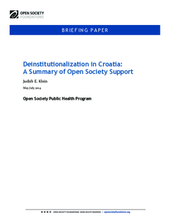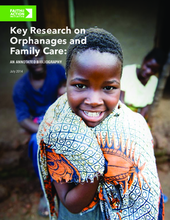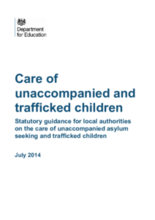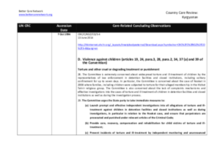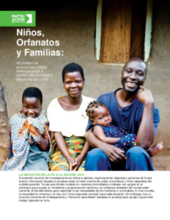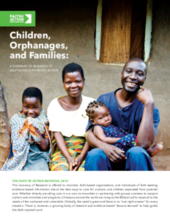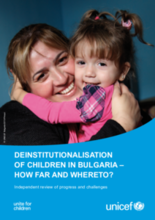Displaying 1851 - 1860 of 2223
The One Step Forward book is a visual guide to resilience, written and illustrated by young people in foster care.
In this chapter of the Handbook of Child Well-Being, the authors review the findings from research on the cognitive and social-emotional development of children growing up in institutions, foster care and adoption.
This paper examines the benefits and challenges of de-institutionalizing disability residential services in Croatia through Open Society Foundation’s Mental Health Initiative (MHI).
This resource is provided as a working bibliography of key research and evidence-based policy papers on the care of orphans and other vulnerable children separated from parental care.
This guidance sets out the steps local authorities should take to plan for the provision of support for looked after children who are unaccompanied asylum seeking children and child victims of trafficking.
This article discusses the challenges in protecting Guatemalan children and their families from involuntary separation and presents the process, results and implications of a pilot training in which Guatemalan participants from government and civil society explored the efficacy and feasibility of the FGC model in their country.
This country care review includes the care related Concluding Observations adopted by the Committee on the Rights of the Child as part of its examination of the third and fourth periodic reports of Kyrgyzstan (CRC/C/KGZ/4-5) during its 65th Session at its 1880th and 1881st meetings held on 28 May 2014, and adopted, at its 1901st meeting, held on 13 June 2014.
El presente resumen de investigaciones se ofrece a iglesias, organizaciones religiosas y personas de fe que buscan información basada en pruebas sobre la mejor manera de cuidar a huérfanos y niños separados del cuidado parental.
This Summary of Research provides a concise overview of a range of studies and findings that can inform approaches to caring for children who, through orphanhood, abandonment, or other causes, have been separated from parental care.
This Review, commissioned by UNICEF Bulgaria, is aimed at informing the recommendations for the Bulgarian Government’s Action Plan for the implementation of the National Strategy ‘Vision for Deinstitutionalisation of Children in Bulgaria.’

